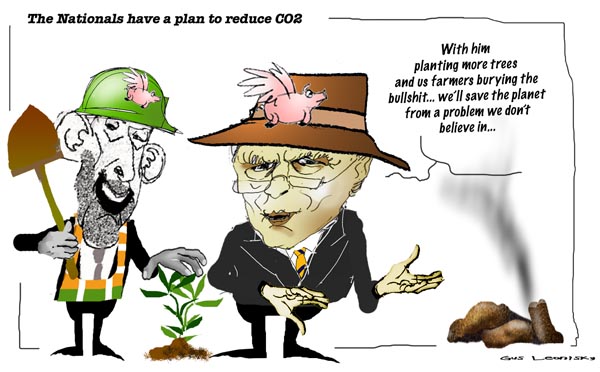Search
Recent comments
- ambassador, please!
6 hours 4 min ago - yuckraine is corrupt....
8 hours 54 min ago - reviving bucha....
9 hours 15 min ago - US complaints.....
11 hours 51 min ago - worse than worst.....
15 hours 15 min ago - of hostages...
15 hours 19 min ago - pf hostages...
18 hours 1 min ago - switzerland sux.....
18 hours 4 min ago - whoever they are....
19 hours 49 min ago - unaligned world....
20 hours 2 min ago
Democracy Links
Member's Off-site Blogs
carbon credits...

- By Gus Leonisky at 26 Sep 2011 - 9:30am
- Gus Leonisky's blog
- Login or register to post comments
the COAL-ition would cost more for less reduction...
Under the Gillard government's proposed carbon tax, the revenue will be recycled to ensure that 90 per cent of households will be no worse off and that compensation will be paid to the most trade-exposed industries. This will hardly cause a blip in the inflationary radar, but it is being debated obsessively in terms of how it will affect the political fortunes of the major political parties. Once the tax comes in, in July next year, most of the electorate will wonder what the fuss had been about.
The Coalition opposes a carbon tax and has promised to spend $3.2 billion on carbon abatement projects over four years, financed by unspecified expenditure cuts. Per tonne, the Coalition cuts will be twice the cost of those under the Labor carbon tax and there will be no compensation.
But the Coalition has no mechanism to discourage new investment in high-emission industries such as coal-fired power stations, providing they adopt ''best practice'' in order to minimise emissions. The policy is neither cost effective compared to a carbon tax nor administratively feasible.
Read more: http://www.smh.com.au/opinion/politics/on-climate-change-its-allout-war-20110925-1krlh.html#ixzz1Z2ZQ3GaD
cold violet rays...
Recent cold winters that brought chaos to the UK and other places in northern Europe may have their roots in the Sun's varying ultraviolet emissions.
The latest satellite data shows the UV output is far more changeable than scientists had previously thought.
A UK scientific team now shows in Nature Geoscience journal how these changes lead to warmer winters in some places and colder winters in others.
The researchers emphasise there is no impact on global warming.
The Sun has recently been in a quiet phase of its regular 11-year cycle, which co-incided with three years in which the UK, along with other places in northern Europe and parts of the US, experienced cold conditions unusual in the recent record.
http://www.bbc.co.uk/news/science-environment-15199065
Please note that:
But unusually warm weather was felt both further south, around the Mediterranean Sea, and further north in Canada and Greenland.
And also:
"The Little Ice Age wasn't really an ice age of any kind - the idea that Europe had a relentless sequence of cold winters is frankly barking, but there was a larger proportion of cold winters," he told BBC News.
"We now have a viable explanation of why that happened - nothing to do with global warming, but in terms of temperature re-distribution around the north Atlantic."
Meanwhile global warming due to EXTRA CO2 and methane — brought out by human activity into the present "natural" carbon equation of the lower atmosphere — is going along gangbusters...